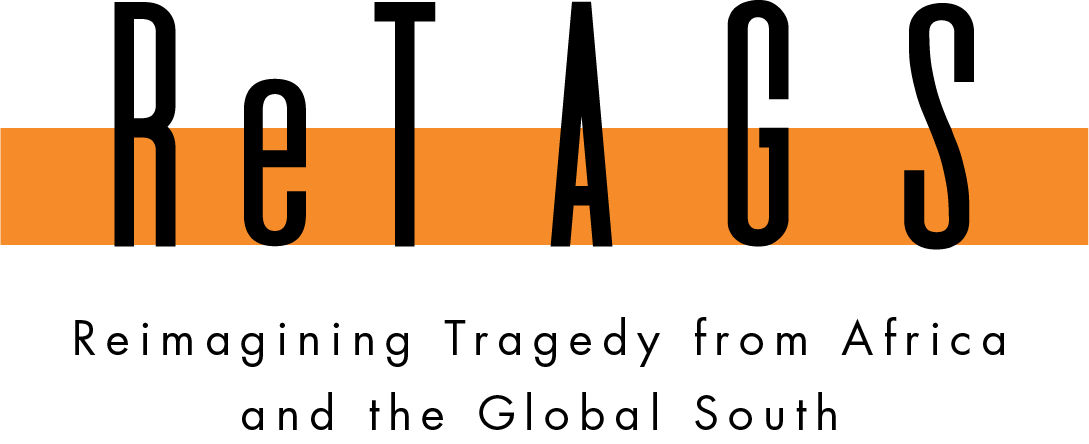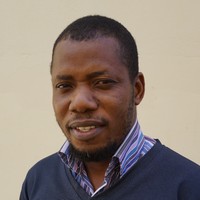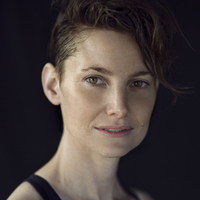Oral history interview with Nosa Omoregie
Title
Interviewee
Interviewer
Date Created
Recorded At
Duration
Capturer
Transcriber
Keywords
Language
Rights
Identifier
Nosa Omoregie
Olalekan Balogun
RETAGS
Monday 14 October 2019
Transcribed by Jayne Batzofin
Balogun Okay, I'm here with another Nigerian actor who has been a production manager in quite a whole number of professional shows in Nigeria. Please can we meet you officially?
Omoregie My name is Nosa Omoregie.
Balogun So Omoregie it is a pleasure being with you. So this project that we are having an interview on is entitled "Reimagining Tragedy in Africa and the Global South (RETAGS). It's being led by Professor Mark Fleishman, director of the Centre for Theatre, Dance and Performance Studies, University of Cape Town in South Africa. The starting point is that we are looking at the reimagination of Greek Tragedies in Africa and some of other places. And as a student of a Nigerian artist I'm sure without any doubt, you must have been involved in one adaptation of a Greek play, in your career as a graduate of theatre and a professional theatre practitioner. Would you like to talk about it?
Omoregie Yeah. I think the major one that I'm very familiar with is The Gods are not to Blame.
Balogun What?
Omoregie The Gods are not to Blame.
Balogun The Gods are not to Blame, that's Ola Rotimi.
Omoregie Ola Rotimi, The Gods are not to Blame. I actually played Gbonka. Then I think that was 1998 …
Balogun 1998?
Omoregie Yeah.
Balogun That was about how many years ...
Omoregie It was like 20 …
Balogun 21 years ago. Wow, that's interesting. Gbonka, Gbonka was the man that was given the baby to take it to the bush, and told to kill it …
Omoregie Told to kill it, but he decide to …
Balogun Okay, tell us a bit about that production, at least the bits you can still remember.
Omoregie You see those days, The Gods are not to Blame, is one of the best play ever performed or that even got myself involved, you know. But you know at that time theatre was a kind of a very important thing… everybody wanted to act, everybody wanted to perform so we do it with every energy that we had. So we tried not to interpret it, the way the director wants us to. Or that some people don't do research. We went as far as going to Badagry so that we could get adequate concentration on what we are actually doing. Then we just pass--
Balogun Badagry is like the border to the Republic of Benin
Omoregie Benin, yeah. So we have to camp there, we camped ourselves for almost two weeks there.
Balogun Okay, so you prepared the play in a camp just to be away from the city …
Omoregie Because already we were supposed to come and perform it to different schools in Lagos State. So we needed a place out of Lagos. We started in Igbobi college, where we normally have rehearsals, you know. But due to, that was when our late president died.
Balogun Abacha.
Omoregie Abacha, and the whatever, so went back to Badagry. So that's …
Balogun Okay, so let's look at … so you played …
Omoregie Gbonka.
Balogun … can you remember the number of actors that were involved in the play?
Omoregie Well …
Balogun I know it is quiet long [ago].
Omoregie Yeah, yeah, I can say we were maybe up to like 15 or there about 20.
Balogun 15.
Omoregie Yeah.
Balogun Okay. Considering that the play is an epic then it means the director must have tried to manage a small cast.
Omoregie Yes.
Balogun Because I would imagine that a small cast, I have talked to people who have said they have used about 40 people.
Omoregie Yes, yes. There was no fund.
Balogun To produce it?
Omoregie Yeah. Even the director did as a result of passion for theatre.
Balogun Oh.
Omoregie And we raise fund among ourselves.
Balogun To put the play onstage?
Omoregie To put the play onstage. Majorly because, one he has played Odewale before…
Balogun You mean the director?
Omoregie The director.
Balogun Okay. So he acted in the play and he wanted to direct …
Omoregie He wanted to direct it, and there was this crisis of finance. So he needed to bring fresh graduates from secondary school just to achieve his aim probably after then to start going to different schools for financial, you know, purposes.
Balogun Okay, so what was his approach like, the directorial approach? How did he approach the work?
Omoregie The directorial approach was somehow … kind of rigid.
Balogun What do you mean?
Omoregie Thank you. Rigid, in the sense that he wants to realise what he has gotten from the script. There was no …
Balogun He just relied on Ola Rotimi …
Omoregie … Ola Rotimi, yeah. And in fact he was more unfortunately the man, the director that played Odewale again.
Balogun In the same play?
Omoregie Today, unfortunately the person lost his sight.
Balogun Wow, that is interesting.
Omoregie And that's one of the most interesting. I think about the point of the play Odewale removed his eyes, I used to think that because of, you know … The Gods are not to Blame is a very powerful, looking at it from well the script, and again comparing it to the real African culture, that it has a very strong meaning.
Balogun Kind of metaphysical …
Omoregie Thank you.
Balogun mmm… (pause) So in real life, the guy who directed the play and acted Odewale, in real life at the moment he is blind?
Omoregie Yes and his name is Dotun Adegbite
Balogun That's an interesting one.
Balogun So it means that now considering the fact that there was no funds all of you guys who were involved did it out of passion, so obviously the process of putting it together must have been restricted, apart from you going to camp? And you are in the camp for two weeks?
Omoregie Two weeks.
Balogun So how many days did you run the show? When you brought it back to Lagos onstage, how many performances?
Omoregie I think it was like four.
Balogun Four performance?
Omoregie Four performance, I think.
Balogun The same venue?
Omoregie No we were going to different venues.
Balogun Different venues. So you have four performances in four different venues? And you know it feels like The Gods rely so much on use of music, dance, choreography… How did you -
Omoregie Funny enough then, the choreography wasn't really reflecting …
Balogun Why?
Omoregie Thank you. Because one, the cast was few
Balogun mmm.
Omoregie And again the director basically relied on the message …
Balogun Okay, he emphasized dialogue.
Omoregie Yes.
Balogun Alright.
Omoregie And so the music side, the choreography dance side wasn't really coming up, then -
Balogun He didn't pay that much attention?
Omoregie … much attention because there was no dancers … except -
Balogun Oh, there were no dancers? (chuckles)
Omoregie No dancers. The only thing we could use was the music to illustrate some certain things.
Balogun So how was the music generated? Like normal songs …
Omoregie Yeah, yeah mixed Yoruba songs then the Bini song, (he sings a short tune) – that's Ibo.
Balogun That's Ibo?
Omoregie Yeah because I think he had done some few things with the National Theatre t…
Balogun National Troupe?
Omoregie National Troupe, so he could get all those music. And in fact we learnt from that side, so we played on the music. He just used the women and some of the men that could sing to …
Balogun And what about the costumes?
Omoregie Yeah, the costume. Funnily enough the costume was created or …
Balogun Built?
Omoregie … (tentatively agreeing) yeah built then some of us came with our parents' old attires. Because they are old, I brought my own grandfathers agbada.
Balogun Costume to perform?
Omoregie Yeah you know to perform. Not to perform for myself because Gbonka didn't really need anything …
Balogun Yeah
Omoregie So to help the King, Adetusa himself, you know. Then Odewale then never needed… who is Odewale?
Balogun The lead character.
Omoregie … the lead… no what about this …Aderopo.
Balogun Aderopo.
Omoregie Aderopo didn't need anything elaborate too. So we played down Aderopo. Then we have to lift the char -
Balogun So you are just an economical use of -
Omoregie Yes, very good, that's the word.
Balogun Now let's look at that play, in the context of our socio-reality. To what extent can you say that The Gods are not to Blame actually dramatises what does that mean, outside and not the one that is performed onstage?
Omoregie Yes you see, funny enough you actually brought me back to that time of performance. Funny enough when we were reading the script or performing, we felt we belonged to the past.
Balogun You felt what?
Omoregie That belongs to the past. As in, what has happened in the past and what… Because now I am seeing it even in the present.
Balogun What specifically are you talking about?
Omoregie Yes, like man sleeping with the mother …
Balogun With the mother? Okay that story …
Omoregie You know the prophecy and Odewale …
Balogun … killed the father
Omoregie … killed the father.
Balogun Okay, if I got you, when you were staging the play you thought that the play that that kind of subject would only happen in the past or can only be imagined …
Omoregie Imagined, yeah, thank you.
Balogun But it is happening in real life -
Omoregie It is reality now.
Balogun mmm.
Omoregie In fact we have had several cases. In fact in the school I happen to be very close to one of their publicists. There are certain reported case of such. And presently Lagos -
Balogun Of a man …
Omoregie Of a man dating the daughter, sleeping with the daughter.
Balogun mmm.
Omoregie And it's even rampant now that Lagos State has given all the schools, private schools, a kind of an alert that should inform them if somethings happen – that it's happening.
Balogun So incest is now like a very common thing.
Omoregie It's so common.
Balogun You can actually have a father, you know …
Omoregie Most things….
Balogun … sleeping with a daughter …
Omoregie …I think that -
Balogun … you have the mother sleeping with his son, with her son.
Omoregie That one has even happened… it's all over the place now.
Balogun Oh –
Omoregie ..it's on the news.
Balogun it's in the media?
Omoregie Yes, the woman said because she felt she had used all her money or everything in order to train the child. I tell you it's becoming something, she doesn't want her child to take the wealth outside. She preferred that the child bring a bit back home.
Balogun And …
Omoregie And then she decided
Balogun She thought that would happen if …
Omoregie Yeah.
Balogun She marries her own son.
Omoregie And there is a case again that the guy happens to be in year two or three in the university, one of Nigerian University. That was sleeping with the mother.
Balogun mmm.
Omoregie And he could tell anybody. It was through his friend, and his friend happens to be a kind of a son to maybe an evangelist or a pastor.
Balogun mmm.
Omoregie That if he released this secret to the son, the son have to go tell the parents and they have to…
Balogun That's an interesting one.
Omoregie So it's becoming…
Balogun So in a way if you look at it, are you suggesting that, of course we imagine that The Gods are not to Blame is fictitious, it is actually a representation of a socio-reality. That's an interesting one. You know Ola Rotimi is also a visionary, the writer said that he wrote the play to condemn the Nigerian Civil War. In terms of tribal and ethnic bigotry,tribal sentiment and so on and so forth. You don't think there's a kind of possibility of reading the play in that light?
Omoregie Well, as a student of theatre and because I've read about some playwrights. At times they write plays out of inspiration or out of … that strong …how will I put it, bite that they want to write a play. But they are not actually in control of that concept of creating what they are writing. It comes, so all they do is to release it.
Balogun mmm.
Omoregie And once they finished, I think Wole Soyinka said that once they finish writing the have forgotten what they wrote about. It is the people and society that come to see what the playwright has written.
Balogun And give it interpretation …
Omoregie And give it interpretation.
Balogun Their own interpretation.
Omoregie In fact, in my life I have come to admit that there is nothing a playwright or an actor does, that doesn't happen.
Balogun mmm.
Omoregie They are just an instrument to create the story. Because everything that has been written has happened. Except if you are not knowledgeable. If you are knowledgeable you have read, so you are someone that reads. I don't like reading much, but I like watching plays and reading plays. In fact maybe watching a play would draw me back to when I read about that play. Are you getting my point? So I have seen, I have come to that conclusion and realising that there's not that a playwright writes that doesn't exist. And I stand to be corrected.
Balogun mmm… (pause)… that's interesting also.
Balogun Thank you so very much for sparring your time to do this interview.
Balogun turns off the audio recorder





